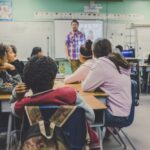What is a discourse? Does everyone possess or or belong to such? James Paul Gee’s ideology of Discourses and its acquisition is confusingly captivating and yet super informative.
Prepare your eyes for a lengthy and hardy body of work and mentally ride along as I attempt to “make sense” of it all with you!
James Paul Gee pretty much defines Discourse, with a big D, as distinctive ways to identify “where you belong” by your “way of life” so to speak.
To further explain, more or less, how we do the following in reflection to who we are then and now….such as our discourses of speaking/listening and/or reading/writing coupled with ways of acting, interacting, valuing, feeling, dressing, thinking, and believing. From what I gather, Gee’s definition of Discourse is a theory that explains how language in part with identity works in harmony amongst society.
Sounds like ALOT on your mental plate, right? Same!
I totally understand your need to simply make sense of these DISCOURSES and why they even exist, but woe is life, lol. Overall, this article basically explains to us why we do what we do, how we decide to do it and how did it all even begin from our childhood/family lives well into our future social networks, decisions, and activities. Think of it THIS way, many discourses are like an Identity Kit! Complete with a costume and instructions on how to (act, speak, and often write). Like a certain role that’s basically recognized by others who “share” in your discourse/community.
So are you asking yourself “How do we even acquire Discourses”? Welp, I’m here to tell ya that it CAN NOT BE TAUGHT. No “overt instruction” or Master Educator can teach you discourses, but rather it can be acquired via “enculturation” or apprenticeship.
In simpler terms ” You can lead a horse to water, but can’t make it drink or Practice makes perfect, NOT overt instruction, LOL!
This theory is also broken down into Primary and Secondary and Dominant vs. Non Dominant “particles” if you will. So, it’s kind of like your home base vs. your social base. How fluent are you at these discourses? Can you gain status/power, monetary values or goods from certain discourses?
This is how you’ll decipher your Primary/Secondary discourses and which are Dominant and Non-Dominant, but remember Dominant discourses are secondary, they are sort of ever-changing and not fully consistent because think about Are we as humans consistent or ALWAYS well integrated from a social and cognitive viewpoint? Nope! Which brings me to the idea that you’ll almost always discover conflict and tension within discourses, as well.
In final summary, Gee pretty much breaks down the hierarchy of the world specifically us as individuals in or out of social groups, networks, status, class, and other influences.
Hopefully, you sort of grasped Gee’s thought process on the Little d and BIG D Discourses a tad more per my wild thoughts and comprehension. 🙂
Carmen Luke’s Pedagogy, Connectivity, Multimodality, and Interdisciplinary
Reading this article was quite interesting, due to being an Educator and Parent.
I was able to connect from both aspects and truly process the ‘meat and potatoes’ of Luke’s thoughts on this topic. We (society) have quickly traveled away from our historical and past ways of comprehension and our will to actually learn and teach, due to this new age way of accessing and gaining information. Digital technologies and literacies have made it quite difficult to simply be present and to also ‘feed’ our minds and our beings without the access to new modes of textual practices such as text, email and chat, just to name a few, and limits our present engagement with others. Personally, I daydream of the days we can return to “static print” and textbooks, as opposed to inconsistent Wi-Fi and electronic devices.
Remember the days, of simply reading text, wrapping textbooks for school and actually being excited to raise your hand in class because you actually USED YOUR BRAIN CELLS to read, think, and obtain information.
Nowadays, you can simply call on Alexa or Siri and you’re super smart (insert eyeroll), lol.
Technology is great whether in or out of the classroom .It makes a GREAT collaborative learning component; however, this very thing that has also caused immense shifts in our society. Culturally, socially, financially, so forth and so on.
Yes, learning the world around us occurs in a blend of old and new forms, but in my opinion it definitely should not replace our initial and traditional ways of learning, but now that I think about it-those days are quite long gone unless implemented on a case by case or individual basis or contingent upon family values. To clarify, sort of like the saying ‘it starts at home’. Even though we live in a world dominated by the pedagogy of tech and digital ‘stuff’; learning should continue to be diversified and not reliant upon Computers, I-pads, tablets, smartboards, and these futuristic bot beings.
Photo by Mario Purisic on Unsplash





Leave a Reply